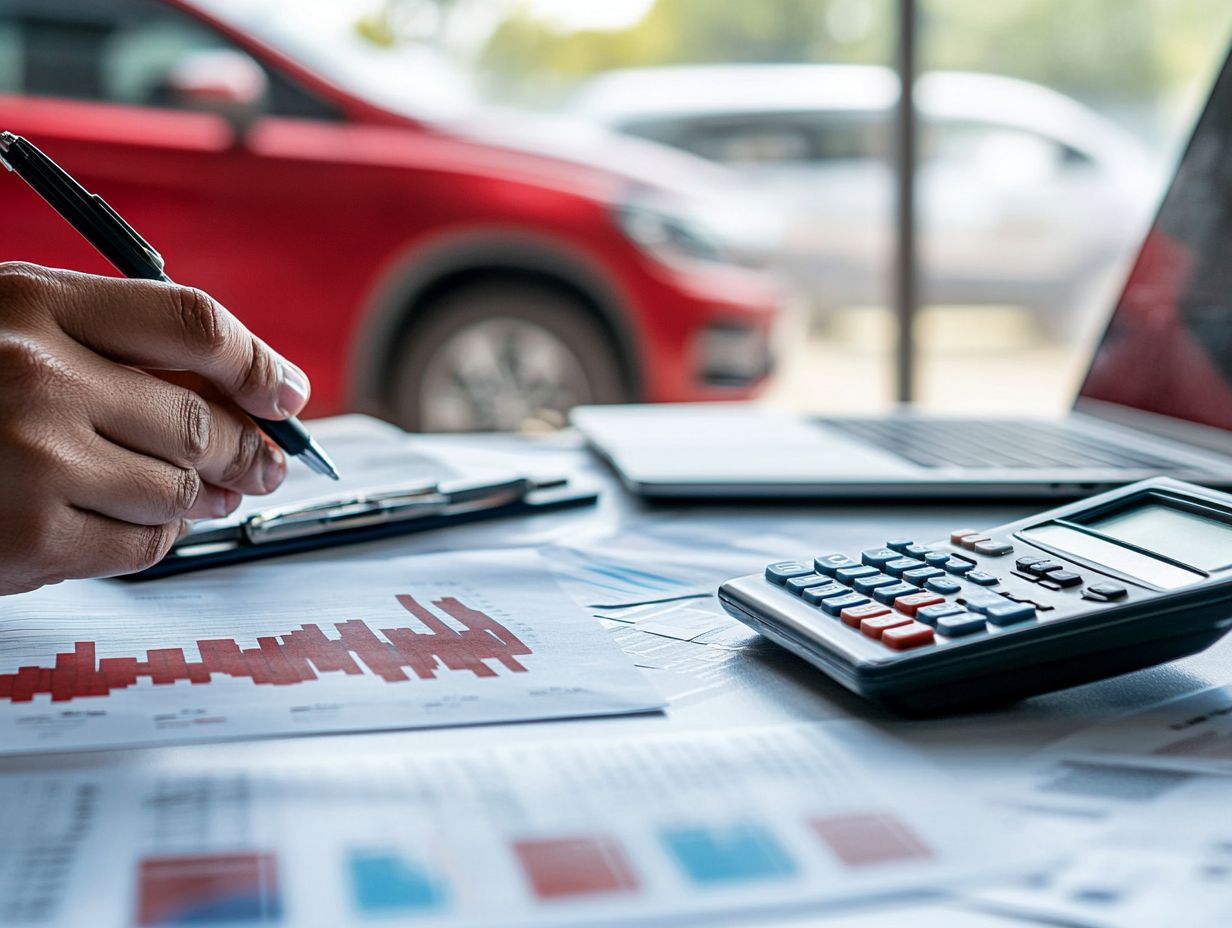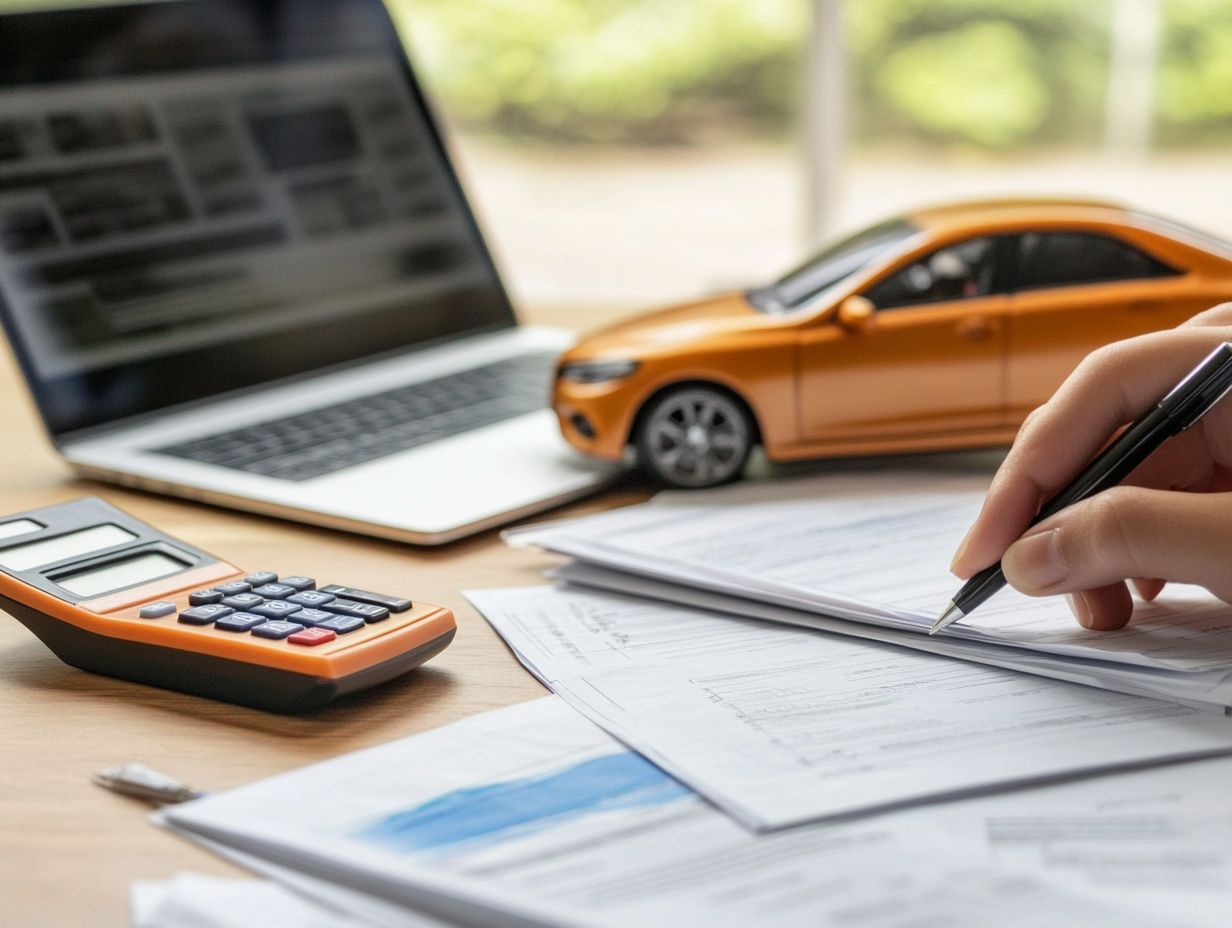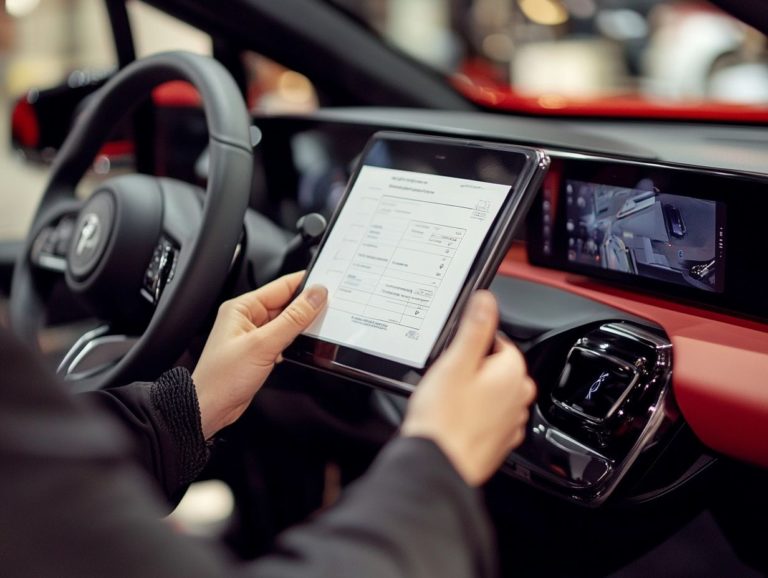How to Compare Resale Values of Cars
When you’re considering buying or selling a car, grasping its resale value can truly change the game for you.
Resale value affects not only your potential profit when selling but also plays a crucial role in your buying choices. Several factors come into play, including the car’s age, mileage, brand reputation, and market demand.
This article will walk you through the nuances of resale value, show you how to determine it, and offer tips for maximizing it. Whether you’re a seasoned seller or stepping into the market as a first-time buyer, you’ll discover valuable insights to help you navigate the automotive landscape with confidence.
Contents
- Key Takeaways:
- Understanding Resale Value
- Factors that Affect Resale Value
- How to Determine Resale Value
- Tips for Maximizing Resale Value
- Keep Your Car in Tip-Top Shape for Maximum Value!
- Frequently Asked Questions
- What factors should I consider when comparing resale values of cars?
- Is it important to compare resale values of cars?
- How can I find the resale value of a specific car?
- Should I only compare resale values of cars from the same year?
- What are some common mistakes people make when comparing resale values of cars?
- Can I negotiate the resale value of a car?
Key Takeaways:

- Research historical data and consult experts to determine a car’s resale value. Consider factors like age, mileage, brand reputation, and market demand.
- Regular maintenance and choosing popular features can help maximize a car’s resale value.
- Timing is crucial; sell your car at the right time to get the best resale value.
Understanding Resale Value
Understanding resale value is essential for both current and prospective vehicle owners. It impacts not only the financial return you can expect when selling a vehicle but also its overall market appeal.
Several factors come into play, including vehicle depreciation, brand reputation, and current market trends, all of which significantly influence resale values. Each make and model be it Toyota, Honda, or Jeep possesses unique characteristics that determine how well it retains value over time.
This section aims to explore the intricacies of resale value and illuminate its critical importance within the automotive industry.
What is Resale Value and Why is it Important?
Resale value represents the anticipated worth of a vehicle when you decide to sell it after a period of ownership. This aspect is crucial for anyone looking to maximize their investment in various makes and models.
Understanding this concept is essential, as it directly impacts how much you can recover when it’s time to part ways with your vehicle. Essentially, higher resale values mean more significant financial returns for you.
The importance of resale value becomes even clearer when you consider factors like vehicle depreciation, which tends to hit hardest in the first few years of ownership, along with the ever-changing market trends that can sway demand.
Elements such as the condition of the vehicle, its mileage, the reputation of the brand, and any additional features you might have are all critical in determining resale expectations. Therefore, it’s vital for both potential buyers and sellers to carefully consider these factors.
Factors that Affect Resale Value
Several key factors profoundly influence the resale value of your vehicle. Consider its age, mileage, brand reputation, and the current dynamics of market demand and supply. Each of these elements plays a crucial role in determining the optimal resale value for various makes and models.
By understanding these factors, you can make smarter decisions and boost your selling power!
Age and Mileage
The age and mileage of your vehicle are key factors influencing its depreciation rate and, ultimately, its resale value.
As your car ages, the wear and tear from daily use become increasingly evident, diminishing its market appeal. For instance, you might be surprised to learn that a typical car loses around 20% of its value in the first year alone, and this figure can climb to about 60% by the five-year mark. Mileage also plays a pivotal role; vehicles with high mileage often deter potential buyers.
However, certain brands like Toyota and Honda outperform others in this arena, as their models usually retain more value over time, thanks to their reliability and strong reputation. Interestingly, a well-maintained Toyota Camry or Honda Accord can still command a respectable price, even when it has higher mileage, compared to similar vehicles from other manufacturers.
This clearly demonstrates how the interplay of age, mileage, and brand trust significantly impacts resale value.
Brand and Model Reputation

Brand and model reputation plays a pivotal role in determining resale value. Vehicles from manufacturers with strong reputations tend to hold their value more effectively over time.
This fact becomes particularly clear when you compare various automotive brands in the marketplace. Take Toyota and Honda, for example; they consistently rank high in customer satisfaction and reliability. This directly contributes to their impressive resale values. A Toyota Camry, celebrated for its durability, often commands a price significantly higher than many competitors after several years on the road.
Similarly, Subaru s strong reputation for safety and performance in challenging weather conditions results in high demand for used models, especially in regions prone to inclement weather. Brands that struggle with reliability often see their resale values plummet, underscoring the undeniable connection between a vehicle’s reputation and its second-hand worth.
Market Demand and Supply
Market demand and supply play vital roles in shaping resale value. Heightened interest in specific vehicle models often drives up prices in the resale market.
Take the Jeep Wrangler, for example. When its popularity spikes due to a new off-road trend, you ll notice its resale value climbing as eager consumers rush to snatch up used models. If GMC launches a new truck that captures widespread attention, older models may see a decline in value as buyers flock to the latest features and technology.
This dynamic interplay between supply and demand reveals how shifting consumer preferences and market trends can significantly impact the resale prices of various brands, creating an intriguing landscape for both sellers and buyers.
How to Determine Resale Value
Determining the resale value of a vehicle requires a thoughtful analysis of historical data. To enhance your research, learn how to use price comparison tools for cars and utilize reputable auto research sites to gain a clear understanding of the specific characteristics inherent to different makes and models.
This comprehensive approach ensures that you secure the best possible resale value for your vehicle.
Researching Historical Data
Researching historical data is crucial for grasping the resale value of a vehicle. It unveils how similar makes and models have fared over time, helping you understand how to spot overpriced cars.
By leveraging various reliable auto research sites, you can effortlessly compare past sales trends and depreciation rates. Websites like Kelley Blue Book and Edmunds offer a wealth of tools that empower you to analyze historical data with ease.
These platforms typically showcase graphs and tables that illustrate fluctuations in resale values over the years, allowing you to pinpoint the factors influencing vehicle worth.
Utilizing these resources enables you, as a potential buyer or seller, to make informed decisions grounded in real-world data. This guarantees you land the best deal possible in the ever-evolving automotive market.
Consulting Experts and Resources
Consulting with experts and utilizing reputable resources are essential steps in accurately determining the resale value of your vehicle. This is especially true for specific makes and models.
By tapping into insights from industry professionals, you can gain a clearer perspective on market trends, fluctuations, and the factors that influence a vehicle’s value. Platforms like Kelley Blue Book and Edmunds provide comprehensive valuation tools that incorporate real-time data, enabling you to make informed choices.
Connecting with local dealerships or automotive appraisers can also offer you personalized assessments. These experts often possess firsthand experience with buyer preferences and market demands, allowing you to strategize effectively and maximize your returns.
Tips for Maximizing Resale Value

Want to get top dollar for your vehicle? Here are some fantastic tips to boost your resale value!
Maximizing your vehicle’s resale value is essential to mitigate the effects of depreciation and enhance your financial returns when it comes time to sell. There are several effective strategies you can employ to achieve this goal.
Keep Your Car in Tip-Top Shape for Maximum Value!
Keep your car in top shape and watch its value soar! Regular maintenance is key. It helps you get the best value for your vehicle.
For example, routine oil changes keep the engine running smoothly and help you avoid costly repairs later on. Regular tire rotations ensure even wear, enhancing both safety and performance.
Addressing minor issues promptly like chipped paint or small dents can save you from larger, more expensive repairs down the line. Plus, maintaining detailed service records instills confidence in potential buyers, showcasing your care for the vehicle. This ultimately contributes to a higher resale value, making all those maintenance efforts worthwhile.
Choosing Popular Features and Options
Opting for popular features and options can significantly boost your vehicle’s resale value. Certain amenities are frequently sought after by buyers.
Take, for instance, advanced safety features, touchscreen infotainment, and premium audio systems; these elements can make your vehicle truly stand out. Luxury brands like BMW and Audi often showcase high-end materials and unique tech features that attract discerning buyers.
On the other hand, trucks from Ford and Chevrolet shine with their desirable towing capabilities and off-road packages, catering to those who value rugged versatility. By thoughtfully selecting these options, you enhance your driving experience and position yourself to command a higher price when it comes time to sell.
Selling at the Right Time
Selling at the right moment is crucial for maximizing your vehicle’s resale value. Various market conditions can significantly impact how much your car retains of its initial worth.
Understanding market trends is essential for timing your sale. Many sellers find that vehicles often command higher prices in the spring and summer months, especially for convertibles and SUVs.
Being mindful of when dealerships restock their inventory can also make a substantial difference. Selling just before new models arrive might lead to better offers. Fluctuations in gas prices can also influence resale values, prompting buyers to look for fuel-efficient options when costs rise.
Keep your finger on the pulse of economic indicators and consumer preferences to increase your chances of securing a favorable deal.
Frequently Asked Questions
What factors should I consider when comparing resale values of cars?

When comparing resale values of cars, consider factors such as make and model, age, mileage, condition, and popularity. For a deeper understanding, check out how to utilize online price comparisons for cars. These elements can greatly affect a car’s resale value.
Is it important to compare resale values of cars?
Yes, comparing resale values is important. It helps you make informed decisions when buying or selling a car and provides insight into how to evaluate new car resale value and potential depreciation over time.
How can I find the resale value of a specific car?
You can find the resale value of a specific car using online tools like Kelley Blue Book or Edmunds. These websites provide estimated resale values based on make, model, and year.
Should I only compare resale values of cars from the same year?
No, it’s important to compare values from different years. This can show you the depreciation rate of certain makes and models over time.
What are some common mistakes people make when comparing resale values of cars?
Common mistakes include only looking at the initial purchase price, not considering the car’s popularity in the market, and neglecting to factor in the condition and mileage.
Can I negotiate the resale value of a car?
Yes, you can negotiate the resale value of a car when you buy or sell it. Understanding how many people want to buy a car like yours and its condition can influence the price.
Don’t miss your chance to get the best value! Features like upgrades or special maintenance records can also play a role in the final price.




